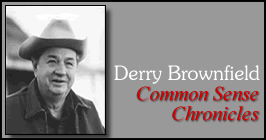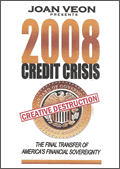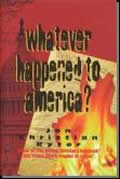TIMES GOT MUCH BETTER
By
Derry Brownfield
January 1, 2011
NewsWithViews.com
I began broadcasting farm news and markets January 2, 1973 on one of the first regional radio networks in the nation. Never before had farmers heard market news aired ten times during the day and, as a result, I was invited to speak at farm and bank meetings all across the Midwest. I recently received the following comment from a long-time listener, “Derry—I have been a daily listener since I heard you give a speech in Mt. Vernon, Illinois in October, 1973.” I hear from people on a regular basis that remember some of my stories. In 1973 I was 40 years old and most of the audience was middle-aged and older. When I talked about the Great Depression they understood my stories. I claimed that I was a “child of the depression.” Being born in 1932, I came along with the Drought, the Dust, the Depression and the Democrats; every year that I had been alive, “times were getting better.” In 1973 our economy was much improved since the early 30’s.
I would joke about Herbert Hoover being president and how he didn’t invent the vacuum cleaner; instead he took the country to the cleaners. The audience always responded, however most people in today’s audience never heard of Herbert Hoover, and that’s the cause of much of our economic problems. In the early 30’s, millions of workers had lost their jobs, consumers would only buy necessary items, school kids wore hand-me-down clothes and most of the middleclass had only one pair of shoes. Manufacturers were “shutting” down, banks were closing, farms were being repossessed and hobos would get off freight trains and knock on doors asking for a hand-out. Times certainly got better and my 1973 audience understood that a depression could happen again.
In those days banks made only conservative loans, farmers didn’t trade tractors until their old one wore completely out, consumers didn’t trade cars each time a new model came out and the majority of consumers only purchased things they could pay for with cash. By the mid to late 1970’s a new generation of consumers, farmers, bankers and businessmen came on the scene. People who could not remember the hard times were willing to buy on credit and pay later. Inflation made farmland increase in value and the Farm Credit System convinced the younger farmers to go into debt, refinance and buy more land. The consumer began to max-out one credit card after another and the federal government was forced to raise the debt limit on an annual basis. Although we had a set-back in the 1980’s, when interest reached 20%, no one looked back to 1930 and anticipated what could happen when we were living in a debt based society.
I truly believe history repeats itself, but this time there will be some major differences. During the Great Depression manufacturers only “shut” down. Today they no longer exist as we have out-sourced much of our production. Our national debt that was held by U.S. citizens during the roaring twenties, is now held by foreign governments. When the stock market crashed in 1929 it was really a separate occurrence from the depression that followed. Several things happened to create the depression. America reduced the gold content of the dollar by 40%, foreign investors sold their U.S. stocks and the Federal Reserve took money out of the banking system, which was supposed to stop the stock market frenzy. It took World War II and 24 years to recoup, as the Dow didn’t reach the September 3, 1929 high until 1956.
Our society is now made up of millions of people who were never taught American history and have little knowledge of how the free enterprise system works. This generation has been pampered by parents that want their children to have all the things unavailable to them during the depression. This present generation wanted for practically nothing as there was always an invisible hand waiting to give them another credit card. The hobos who rode the rails during the 1930’s were a different breed than today’s homeless. For the most part they were raised in Christian homes, they respected property, were trustworthy and had visions of better times ahead. Also many who had left the farm to work in the city moved their families back home with Mom and Dad, where they could grow a garden, milk a cow, help with the farm and wait until the economy improved.
Pat Buchanan recently wrote concerning the people of the Great Depression, “A less affluent America survived a depression and a world war without anything like the 99 weeks of unemployment insurance, welfare payments, earned income tax credits, food stamps, rent supplements, daycare, school lunches and Medicaid we have today. What we have accepted today is a vast permanent underclass of scores of millions who cannot cope and must be carried by the rest of society—fed, clothed, housed, tutored and medicated at taxpayers’ expense for their entire lives.
| Subscribe to the NewsWithViews Daily News Alerts! |
When these people become totally destitute they will not have the same attitude as did the hobos of the 1930’s. If what is happening in Europe is any indication as to what may take place here, there will be rioting, looting and a total breakdown in society. This could very possibly lead to a police state. The legislation to allow a military takeover was signed into law with the Patriot Acts I and II, along with the many Executive Orders signed by presidents all the way back to John F. Kennedy. These things do not have to happen; there is still time for change, but those changes must be drastic and carried out quickly by all the citizens of these United States. I believe it will take an act of God to perform such a miracle, and He says He will: “If My people called by My name, shall humble themselves, and pray and seek My face, and turn from their wicked ways; then will I hear from heaven, and will forgive their sin, and will heal their land” -2 Chronicles 7:14.
I believe this is the only change that can save this nation. Let’s pray that this change comes quickly.
� 2011 Derry Brownfield - All Rights Reserved









 Share
This Article
Share
This Article



